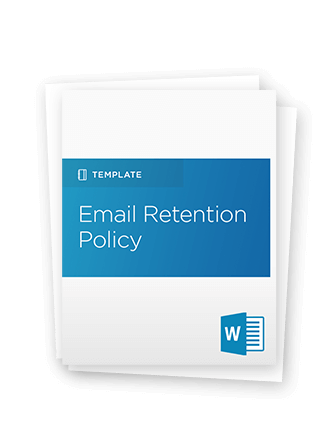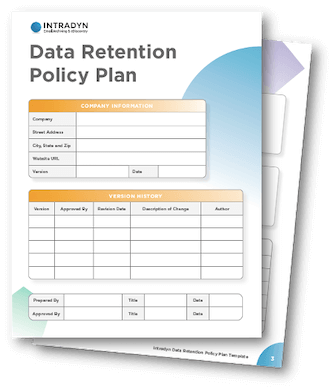Email Archiving for SOX Compliance: What You Need to Know about the Sarbanes Oxley Act of 2002

In today’s digital world, where corporate scandals can bring down billion-dollar empires overnight, regulatory compliance has become more than just a checkbox; it’s a critical lifeline. One of the most significant laws shaping this reality is the Sarbanes-Oxley Act of 2002 (SOX), legislation born from crisis and controversy that changed the landscape of corporate accountability and information management.
Quick Overview of what this blog will cover:
- What the Sarbanes-Oxley Act (SOX) is
- Key SOX Sections (302, 404, 802) Relevant to Email Archiving
- Email Archiving and SOX Compliance
- The Importance of SOX in Today’s Corporate Environment
- Why Proper Email Retention Matters
- What to Look for in a SOX-Compliant Archiving Solution
What is the Sarbanes Oxley Act?
In the early 2000s, a wave of accounting scandals swept Wall Street, undermining faith in U.S. capital markets. Companies, including Enron and WorldCom, had manipulated financial statements to hide debt and inflate profits, deceiving investors and costing them billions in market value. These events highlighted the urgent need for reform.
In July 2002, Congress passed the Sarbanes-Oxley Act of 2002 (SOX), a pivotal U.S. federal law designed to safeguard investors by improving corporate financial disclosures’ accuracy, integrity, and transparency. It aids in combating corporate fraud, enforces ethical business practices, and rebuilds trust in the economic system through stricter oversight and transparency.
“Sarbanes-Oxley Act of 2002 – Title I: Public Company Accounting Oversight Board – Establishes the Public Company Accounting Oversight Board (Board) to: (1) oversee the audit of public companies that are subject to the securities laws; (2) establish audit report standards and rules; and (3) inspect, investigate, and enforce compliance”
How Email Archiving Supports Compliance with SOX Sections 302, 404, and 802
Understanding Section 302: Corporate Responsibility
“(Sec. 302) Instructs the SEC to promulgate requirements that the principal executive officer and principal financial officer certify the following in periodic financial reports: (1) the report does not contain untrue statements or material omissions; (2) the financial statements fairly present, in all material respects, the financial condition and results of operations; and (3) such officers are responsible for internal controls designed to ensure that they receive material information regarding the issuer and consolidated subsidiaries.”
What It Requires
- Officer Certification: The CEO and CFO must personally certify, each quarter and year-end, that the company’s financial statements are accurate and complete.
- Internal Control Framework: Executives must establish, maintain, and regularly evaluate internal controls to ensure reliable financial reporting.
- 90-Day Evaluation: Within 90 days of any quarterly or annual filing, officers must assess and confirm the effectiveness of these controls.
- Disclosure of Changes: Any “significant deficiencies” or material changes in internal controls must be disclosed immediately.
Why It Matters for Email Archiving
- Preserve Evidence: Emails discussing earnings forecasts, accounting judgments, or audit findings become part of the audit trail.
- Internal‐Control Documentation: Since officers rely on emails to track decisions and control reviews, archiving those messages helps demonstrate that internal‐control processes were followed.
Understanding Section 404: Internal Controls
“(Sec. 404) Directs the SEC to require by rule that annual reports include an internal control report which: (1) avers management responsibility for maintaining adequate internal control mechanisms for financial reporting; and (2) evaluates the efficacy of such mechanisms. Requires the public accounting firm responsible for the audit report to attest to and report on the assessment made by the issuer.”
What It Requires
- Management’s Report: Each fiscal year, management must provide a detailed report on the design and operating effectiveness of internal controls over financial reporting (ICFR).
- External Audit Review: An independent external auditor must attest to—and issue an opinion on—the adequacy of those same controls.
- Ongoing Testing: Companies need continuous testing, monitoring, and remediation of control gaps.
Why It Matters for Email Archiving
- Audit Evidence: Emails that document control reviews, risk‐assessment meetings, or remediation plans serve as key evidence for both management’s report and the external auditor’s testing.
- Retention of Support: To satisfy Section 404, organizations must retain emails showing how control deficiencies were identified, evaluated, and corrected.
Understanding Section 802: Record Retention
“(Sec. 802) Directs the SEC to promulgate regulations governing the retention of documents relating to an audit or review. Establishes criminal penalties for knowing and willful violation of such promulgations.”
What It Requires
- Five‐Year Retention Rule: Audit work papers, review documents, and any communications (including emails) relevant to audits, reviews, or federal investigations must be kept for at least five years.
- Prohibition on Alteration: It is a federal crime to alter, destroy, or falsify any document with the intent to obstruct an investigation.
- Severe Penalties: Violations can lead to significant fines and up to 20 years imprisonment
Why It Matters for Email Archiving
- Legal Compliance: Securely archiving all emails related to financial reporting, audit findings, internal investigations, or litigation ensures you can produce unaltered records on demand.
- Chain of Custody: A tamper‐proof archive demonstrates that no emails were deleted or modified—even inadvertently—which protects against criminal liability under SOX.
Why Email Archiving is Essential for SOX Compliance
SOX doesn’t explicitly dictate how to archive emails, but the implications are clear: companies must have a reliable, secure, and compliant method of storing and retrieving communications.
Without proper archiving, organizations risk:
- Legal Penalties: Non-compliance can lead to civil or criminal penalties, including substantial fines.
- Failed Audits: Inability to retrieve required communications can trigger red flags during external or internal audits.
- Data Loss: Without a centralized archiving system, emails may be lost due to user error, hardware failure, or intentional deletion.
- Reputation Damage: Compliance failures can lead to stock price drops and loss of stakeholder trust.
An effective email archiving system ensures that all business-critical communications are preserved with integrity and reliability. Archived emails must be tamper-proof and stored in a write-once-read-many (WORM) format or protected through encryption and chain-of-custody tracking. This prevents unauthorized alterations and maintains the authenticity of records.
The system should offer robust, granular search capabilities. This makes it easy to locate specific messages during audits or legal discovery. Emails should also be systematically managed, with automatic archiving based on pre-set policies to ensure consistency and reduce the risk of human error.
Key Features of a SOX-Compliant Email Archiving Solution
To support SOX compliance effectively, your email archiving solution should include the following capabilities:
1. Automated Capture
Ensure that every email, whether inbound, outbound, or internal, is captured and archived in real-time, without user intervention. This reduces the chance of anything being missed or tampered with.
2. Tamper-Proof Storage
Look for immutable storage solutions where archived emails cannot be altered or deleted. This may include WORM storage, digital signatures, or blockchain-based verification.
3. Advanced Search and eDiscovery Tools
Fast and precise search capabilities allow compliance teams to locate emails by sender, recipient, subject, keywords, date ranges, and custom tags. This is critical during audits, investigations, or legal reviews.
4. Customizable Retention Policies
Ensure that the system allows you to set retention rules that align with SOX’s minimum five-year requirement while supporting rules for other relevant regulations like FINRA, HIPAA, or GDPR.
5. Legal Hold Functionality
The ability to place legal holds ensures that specific emails are preserved indefinitely, even if they would otherwise be deleted under normal retention policies. This protects the organization during litigation or internal reviews.
Moving Beyond Compliance: Strategic Advantages of Archiving
While SOX compliance is often the catalyst for implementing email archiving, the benefits extend far beyond regulatory requirements. A comprehensive archiving solution can also:
- Reduce IT Overhead: Automated archiving frees up valuable IT resources by eliminating manual email storage and retrieval tasks.
- Accelerate Incident Response: Whether it’s a security breach or HR investigation, quick access to historical communications speeds up resolution.
- Enhance Operational Transparency: Preserving a full communication history provides a more complete picture of how decisions were made.
- Improve Knowledge Retention: When employees leave, their emails remain accessible, capturing years of institutional knowledge.
How Intradyn Can Help
Intradyn’s Email Archiving Solution simplifies compliance by securely capturing and preserving all business-critical emails in a tamper-proof, searchable format. With automated archiving, customizable retention policies, and advanced search tools, your organization can easily meet the requirements of Sections 302, 404, and 802.
Our platform supports legal holds, audit trails, and seamless integration with Microsoft 365, and more, making it easy to maintain compliance while improving transparency and reducing risk. Want to learn more? Explore our Comprehensive Guide to Email Retention Policies.
For a deeper understanding of how to build a strong data management foundation, explore our Comprehensive Guide to Email Retention Policies.
Frequently Asked Questions (FAQ)
What is the Sarbanes-Oxley Act (SOX), and why was it created?
The Sarbanes-Oxley Act of 2002 is a U.S. federal law enacted in response to major corporate scandals like Enron and WorldCom. It was designed to increase corporate accountability, protect investors, and improve the accuracy of financial disclosures through stricter regulations and internal controls.
Does SOX specifically mention email archiving?
No, SOX does not directly mention email archiving. However, its recordkeeping and internal control requirements—especially under Sections 302, 404, and 802—make it essential for organizations to retain, protect, and retrieve email communications as part of compliance efforts.
What types of emails need to be archived for SOX compliance?
Emails related to financial reporting, internal controls, audit processes, risk assessments, executive certifications, and any communications tied to investigations or legal matters should be securely archived to meet SOX standards.
How long should companies retain emails to comply with SOX?
Under Section 802, organizations must retain audit-related documents, including emails, for a minimum of five years. Many companies choose to retain relevant records longer to meet overlapping regulatory requirements.
What are the consequences of non-compliance with SOX?
Non-compliance can lead to severe penalties, including hefty fines, failed audits, or even reputational damage for individuals found guilty of willfully altering or destroying relevant records.


